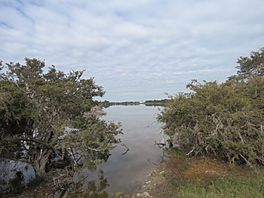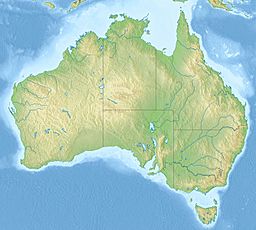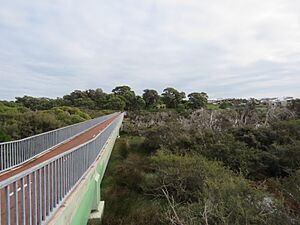Lake Coogee facts for kids
Quick facts for kids Lake Coogee |
|
|---|---|

Lake Coogee seen from the north in June 2021
|
|
| Location | Lake Coogee |
| Coordinates | 32°08′06″S 115°46′36″E / 32.13500°S 115.77667°E |
| Type | Saline |
| Basin countries | Australia |
| Designation | Beeliar Regional Park |
| Surface area | 55 ha (140 acres) |
Lake Coogee is a salty lake located in the suburb of Lake Coogee. It's about 21 kilometers (13 miles) south-west of Perth, the main city in Western Australia. This lake is a special part of the Beeliar Regional Park.
The lake is so important that it gave its name to several nearby suburbs. These include Coogee, North Coogee, and the suburb of Lake Coogee itself. Until March 30, 2020, the lake was actually part of the suburb of Munster. After that date, it became part of the new suburb called Lake Coogee.
What's in a Name?
The original name for the lake comes from the local Nyungar language. They called it Kou-Gee. European settlers first wrote this name down in 1841. Over time, it was spelled in different ways, like Koojee, Coojee, and finally Coogee. This spelling was officially approved in 1955.
Early European settlers also gave the lake another name: Lake Munster. They named it after Prince William, who was the Earl of Munster. He later became King William IV in 1830.
Ancient Stories and Formation
The Noongar people, who are the local Indigenous people, have important stories about Lake Coogee. They believe two birds once stole fire from the moon. This caused a huge bushfire. The moon then asked the ocean for help, and the rising ocean put out the fire. This event is linked to the drowning of Noongar people and how the lake was formed.
Lake Coogee was created around 10,000 years ago. This happened after the last ice age, when the Earth's climate changed. Lake Coogee is different from other lakes in the Beeliar Regional Park. Most of the other lakes have fresh water, but Lake Coogee is salty.
The soil around the lake is made of heavy clay. Scientists think this clay was formed by an old river outlet and estuary (where a river meets the sea) that used to be in this spot. The dip in the land left by this old estuary then became the lake we see today.
Life Around the Lake
In the 1830s, some European settlers tried to live around Lake Coogee. However, these early settlements were not very successful. The local Aboriginal people also tended to avoid this lake, unlike other lakes in the area.
Today, the eastern and northern sides of Lake Coogee have many houses. The western side of the lake borders land owned by the Water Corporation. This company manages water services.
A footbridge was built just north of the lake. This bridge separates Lake Coogee from a swamp called Market Garden Swamp. The idea for this bridge came up in 1998. It was built to carry sewage pipes that lead to a water treatment plant on the western shore of the lake.



